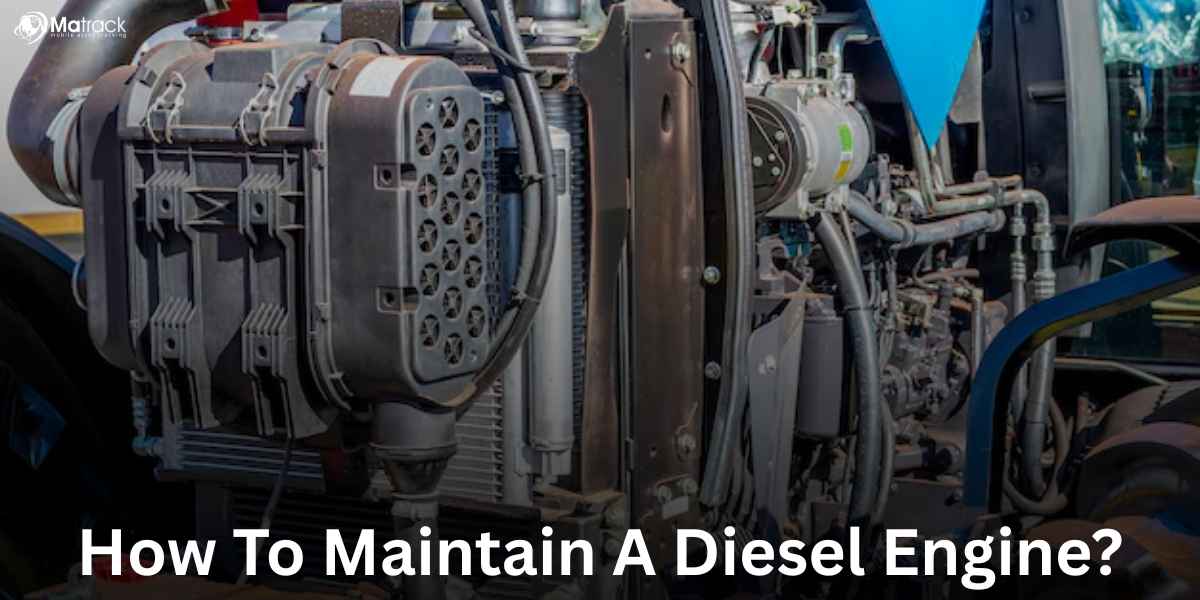Key Takeaways:
- Diesel engines rely on compression-based ignition, which increases torque and fuel efficiency across heavy-duty applications.
- Regular maintenance protects vital components like injectors, filters, and cooling systems from wear and failure.
- Short trips, dirty fuel, and missed service intervals lead to issues like black smoke, cold starts, and higher repair costs.
- Tools like Matrack’s GPS Tracker, ELD Device, and Fuel Card help automate maintenance, monitor fuel use, and extend engine life.
What Is A Diesel Engine?
A diesel engine is a type of internal combustion engine that generates power by compressing air to ignite diesel fuel. This process produces mechanical energy, which drives vehicles, industrial machines, and large equipment.
Its ability to deliver strong torque and high fuel efficiency makes it essential in heavy-duty applications. This performance begins with how the diesel engine functions from the inside, starting with its unique combustion process.
How Does A Diesel Engine Work?
Intake & Compression
Every diesel engine cycle begins by pulling clean air into the cylinder through the intake valve. The piston then moves upward, compressing this air to a high pressure, which causes the temperature inside the cylinder to rise sharply.
Fuel Injection
At the peak of compression, diesel fuel is injected directly into the hot air. The high temperature causes the fuel to ignite instantly, starting the combustion process without the need for a spark.
Power Generation
The energy from combustion pushes the piston downward with great force. This movement turns the crankshaft, which converts the pressure into mechanical energy used to move the vehicle or operate machinery.
Exhaust Cycle
After the power stroke, the piston rises again to expel the burnt gases through the exhaust valve. This clears the way for a fresh charge of air, allowing the cycle to begin again smoothly.
Compression Efficiency
Since ignition relies on heat from compressed air rather than a spark, diesel engines operate with higher thermal efficiency. This efficient process explains their stronger torque output, lower fuel consumption, and long-term reliability.
Why Is Diesel Engine Maintenance Important?
Maintaining a diesel engine keeps it running smoothly and protects it from unnecessary damage. It ensures that each component in the system, from the fuel injectors to the pistons, works under the right conditions with less stress.
Consistent maintenance leads to better fuel economy and longer engine life. Clean filters, fresh oil, and high-quality diesel fuel all help the engine perform with steady power and reliability.
Without regular care, diesel engines develop issues like rough starts, power drops, and increased emissions. These problems often begin small but can quickly affect the entire engine system and lead to expensive repairs.
Diesel Engine Maintenance Checklist
- Scan engine for dtc codes regularly
- Check battery voltage and condition monthly
- Inspect belts and hoses for cracks or wear
- Replace aged or loose drive belts
- Clean battery terminals and apply anti-corrosion grease
- Monitor dashboard for emission system alerts
- Examine exhaust for leaks or abnormal smoke
- Verify glow plug indicator function on startup
- Confirm dashboard lights function correctly
- Ensure coolant reservoir cap seals tightly
How To Maintain A Diesel Engine?
Stick to Schedule
Diesel engines perform best when serviced on time. Following the vehicle maintenance schedule keeps the fuel, air, and lubrication systems working in proper balance.
Use Clean Fuel
Fuel quality has a direct impact on engine health. Filling up at reliable stations lowers the risk of injector damage and poor combustion from contaminated diesel.
Keep It Clean
A clean engine compartment prevents buildup from masking early signs of wear. Regular wiping helps you notice leaks, cracks, or loose components without delay.
Warm Before Driving
Letting the engine idle for a short time allows oil to circulate fully. This reduces internal friction and helps prevent early wear during starts.
Avoid Short Drives
Short trips stop the engine from reaching full temperature. This causes carbon buildup and puts extra load on the emission system.
Watch Dash Alerts
Dashboard warning lights signal early signs of mechanical or system issues. Addressing these alerts quickly protects the engine from further damage.
Listen While Running
Engine noises can reveal problems before they become serious. Identifying knocks, rattles, or whines early helps avoid larger failures.
Store It Right
If the engine will not be used for a while, disconnect the battery and keep the fuel tank full. This prevents battery drain, internal rust, and fuel breakdown.
Track Maintenance
Recording each maintenance task helps you stay organized and consistent. Keeping hours of service logs also supports accurate diagnostics and boosts resale value.
What Are The Diesel Maintenance Tips?
- Use the Right Engine Oil: Always choose oil made for diesel engines. It handles high pressure and keeps everything running smoothly.
- Keep the Fuel Tank Topped Off: A full tank helps prevent air and moisture from getting in. This keeps the fuel clean and protects the system.
- Change Filters When Due: Replace air, fuel, and oil filters as recommended. Clean filters keep harmful dirt out and help the engine breathe and run better.
- Let the Engine Cool Down: After long or hard driving, let the engine idle for a bit. It helps the turbo settle and prevents heat damage.
- Check for Black Smoke: If you see dark smoke from the exhaust, something’s off. It usually means the engine isn’t burning fuel properly.
- Watch Coolant Levels: Keep the coolant at the right level to stop the engine from overheating. Use the proper coolant mix, especially in extreme weather.
- Use Additives in Cold Weather: In winter, diesel can thicken and clog the system. Add anti-gel products to keep it flowing normally.
- Avoid Carrying Too Much: Overloading makes the engine work harder than it should. This wears it out faster and wastes fuel.
- Pay Attention to Noises: If something sounds strange, it usually is. Listening closely helps you catch problems before they get worse.
What Are The Benefits And Diesel Engine Problems?
| Benefits | Problems |
| Higher fuel efficiency | Cold starting issues |
| Longer engine lifespan | Injector clogging |
| Greater torque output | Turbocharger wear |
| Better performance under load | DPF (Diesel Particulate Filter) blockage |
| Lower CO2 emissions per unit of work | Higher repair costs |
How Matrack Helps You In Diesel Truck Maintenance?
Matrack improves diesel truck maintenance through its GPS Fleet Tracker, which monitors engine health in real time. It helps detect early signs of wear or malfunction, allowing for quicker decisions before issues turn into costly breakdowns.
By using Matrack’s ELD Device, fleet managers can track working hours, driving behavior, and mileage with precision. This makes it easier to align maintenance with actual vehicle usage rather than relying on fixed schedules.
Matrack’s Fuel Card brings transparency to diesel purchases and fuel efficiency. With this data, managers can identify unusual fuel patterns, reduce wastage, and protect the engine by ensuring clean, consistent fueling.



